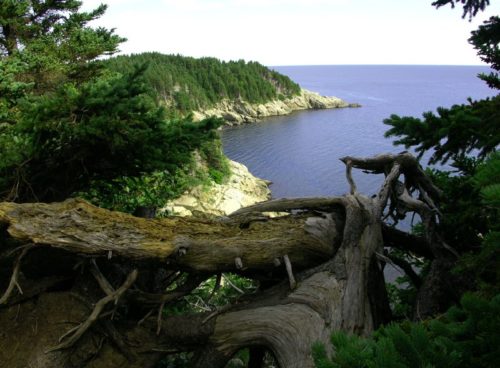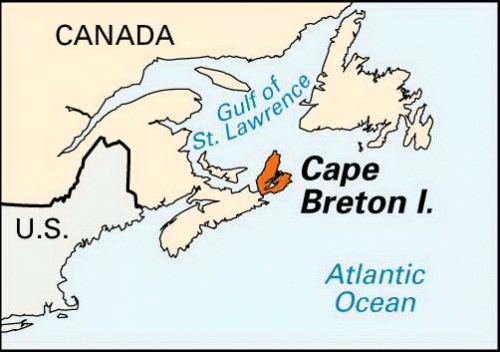SYDNEY, Nova Scotia – On the east coast of Canada, looking out across the Atlantic Ocean, is Cape Breton Island, the northeastern portion of the province of Nova Scotia. This island’s only connection to the mainland is a 1,385 metre (4,500-foot) long causeway across the Strait of Canso. On this rocky, picturesque outpost of Canada is a population of slightly more than 147,000 people, mostly in the urban area of Sydney. The Mi’kmaq are the indigenous people of the land, and were joined first by French settlers in the seventeenth century. English settlers followed, bringing the large and hugely influential Gaelic-speaking population. After the American War of Independence, 3,000 Black Loyalists fled to Nova Scotia. Decades later, freed slaves deported from Jamaica and refugees from the American Civil War escaping slavery via the Underground Railroad, made their way to the province to find safety.

The coastline of Cape Breton Island [Wikimedia Commons]
These lectures started in May, and are geared toward the island’s high ratio of senior citizens, who currently represent 20 per cent of the local population. The speakers are from a wide range of minority religious and spiritual paths. Nova Scotia’s population is overwhelmingly Christian, with 87% identifying as such in the last recorded census. For the diversity lectures, Moore has invited representatives from the local indigenous Mi’kmaq community, as well as presenters from the Jewish, Baha’i, Ahmadiyya Muslim and Wiccan groups in the area.
On the mainland of Nova Scotia, the Pagan presence can be found with relative ease, and various paths are well represented. The Grove of Nova Scotia Druids is an ADF group based in Halifax. The United Pagan Collective, a non-profit organization made up of Pagans from New Brunswick, Nova Scotia and Prince Edward Island, host the Pagan Family Spiritual Retreat from July 15 – 18 and a Witches Ball in autumn. The Earth-Spirit Society of Nova Scotia holds the “Tird Tursday Meet and Greet” [sic] every month in Halifax, and there is even a shop in Dartmouth called Into The Mystic that prides itself on being Canada’s only scent-free New Age gift shop.

But on Cape Breton Island, the Pagan community is small, isolated and relatively underground.
Phoenix Hawthorne, who is Wiccan, is the person that Lynn Moore contacted to make the presentation about her practice for the seniors group. When describing the Pagan scene on Cape Breton Island, Hawthorne said:
The Pagan community in Cape Breton, from my experience, is reasonably healthy, but closeted in many ways. There was a number of practitioners at Cape Breton University when I graduated 10 years ago, and I count about 10 of us among my immediate friends, but our practices are diverse. Most that I’ve met are solitary practitioners, though I’ve performed rituals with one or two friends before. No covens that I know of: it seems like those that do practice often keep to themselves unless in the company of others that they know follow similar beliefs.
At first, Moore wasn’t too sure about how well Hawthorne’s talk would be received by the senior group. She said:
I was nervous that Phoenix would not get the respect she deserved because of her age in comparison to the average age of the group, and the faith itself. We had 20 seniors, from age 50+ to 90 (or she will be in two weeks). I knew there were a few Wiccans around and was very glad to be able to bring Phoenix here to speak to the group. Most (if not all ) had never heard of Wicca.
Moore was not the only one concerned about how a talk about Paganism and Witchcraft would go in a community with a very strong Christian backbone, and to an audience of seniors who grew up in a place and time where religious tolerance and diversity were simply not part of everyday life. Hawthorne recalled:
We have a strong Roman Catholic and Protestant community here, and an aging population. Before the talk, I was extremely nervous, unsure of how it would go over, as some people I have tried to explain my beliefs to have shut down at the first mention of the word “Pagan.”
But, in retrospect, Moore said, “[The seniors] were very interested and asked wonderful questions.” Hawthorne agreed, saying:
The presentation was wonderful; I set up a representation of an altar and explained the implements and how they were used, and discussed the founding of Wicca, the basic concepts, and differences in practice between traditions, as well as group and solitary practitioners. It was very well received, with great questions from those present.
Moore was delighted with the content of Hawthorne’s presentation, more so for the similarities she found, than the differences. She said:
Phoenix explained that there are no covens (or she knows of none) in the area and therefore she worships on her own or with three others. She was kind enough to bring her chalice, her candles, her incense and her Book of Shadows for us to see. She also went over some of the “rituals”, explaining how to cast the circle, the sweeping of the circle, and the elements of purifications.
Her speech lasted about two hours and we all left with a greater knowledge and appreciation for Wicca. I would have to say the most interesting thing I personally came away with was how similar each faith is. We all have a book we should follow, we worship someone or something, and we should not be harming anyone. I strongly believe that what you do for or to others will come back onto you.
Hawthorne’s foray into interfaith work has left her with inspiration for the future of her public work on Cape Breton Island:
I had a lot of positive feedback. Many were surprised with the parallels that can be drawn between Christian practices, and were fascinated with the idea of spell work as prayer with a kinetic element….The big thing is that I would like to see greater visibility of the Pagan community here. I think many people are reluctant to come out of the broom closest fully because of the stigma attached to the idea of being labelled a witch/ pagan/ heathen. After this talk though, I have a lot more hope for more public talks in the future, and would like to take some steps to raise the profile of Paganism in the Maritimes.
Correction 6/6/2016: The article originally stated that “Pagans in the Malagash area” were hosting the Pagan Family Spiritual Retreat. This detail has been corrected to include the name and site for the specific non-profit Pagan organization called The United Pagan Collective that runs the retreat as well as other Pagan events.
The Wild Hunt is not responsible for links to external content.
To join a conversation on this post:
Visit our The Wild Hunt subreddit! Point your favorite browser to https://www.reddit.com/r/The_Wild_Hunt_News/, then click “JOIN”. Make sure to click the bell, too, to be notified of new articles posted to our subreddit.
I am glad the Wiccan talk at the interfaith meeting went so well, and I can only imagine the work in putting together a two hours session by the Phoenix Hawthorn. Most of the time the fear proves more than actually reality requires, yet it is a difficult task to come out in the open. I hope that will be possible fr some of the others when they are ready to do so. Naturally it is their right to decide when to do that, or even if to do that.
Phoenix Hawthorne
I’m very active in growing the Pagan community here in Cape Breton. If Phoenix Hawthorne would like to contact us we can be reached through the Cape Breton Pagan page on Facebook or cbpagans@hotmail.com.
2 Hours!?! I’m impressed. It must of been quite the speech if you had enough material for that amount of time, or was there a lot of audience involvement throughout that helped lengthen it? Wish I was able to sit in on that one to learn and hear the queries, seeing how they matched up with the Christian perspective.
From what I’m seeing in my neck of the woods is that the Christian churches are aging out and closing. Most young people are either non-religious or part of a minority religion (mostly one form of Paganism or another, but also Buddhism, Indigenous beliefs (many don’t see themselves as Religious or Pagan), and Eclectic).